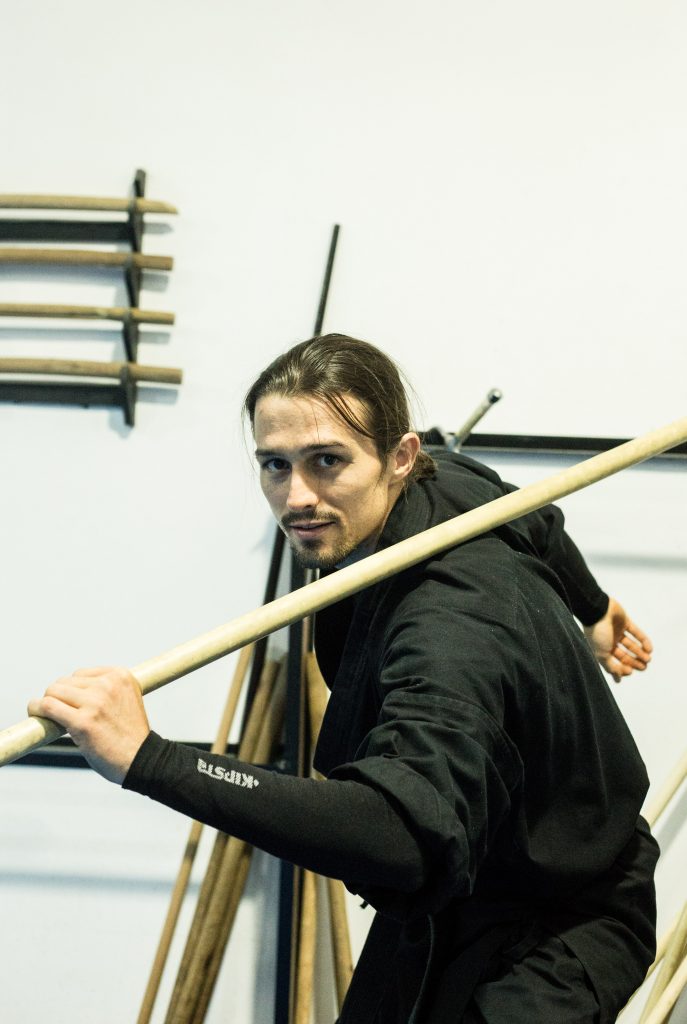
采访时间:2017年10月11日 Interview Date: October 11, 2017
Robert Worth,常被唤作Robbie,中文名“潜剑”,来自美国俄亥俄州。六岁开始学武,曾学过跆拳道、体术(Taijutsu)以及多个国家的各门派武术,目前在武神馆(Bujinkan)武道体术中达黑带六段。2006年初次来蓉,2012年起常居于此。
Robert Worth, aka Robbie, comes from Ohio, USA, and gave himself the Chinese name “Qian Jian.” When he was six years old, he started to learn Taekwondo, Taijutsu and all kinds of international martial arts. He is a 6th Dan Black Belt in Bujinkan Budo Taijutsu. Following his first visit to Chengdu in 2006, he decided to make a move to this city in 2012.
※
我知道门外有人,但我静坐不出,是为忍者。
I know that there is someone outside, yet I make no move, for I am a ninja.
你真的是忍者吗?
Are you a real ninja?
九月,成都一所国际学校做了以“泼水节”为主题的校庆,现场热闹非凡,斑斓的水气球飞窜,大人与小孩共欢。但见人群中有个外国男子,一身素黑宽袍、腰上系带、脑后留辫,驮着个鼓鼓的大黑塑料袋,步子轻快地穿过人群。他也备了许多水球,用来玩Water Ninja(水球忍者)的游戏。玩法嘛,顾名思义,即结合一些武道术的招数玩水球。围成一圈的二三十来人,基本上是毫无功夫底子的“路人”,最终呈现不过是花拳绣腿,仅供娱乐。然而,武术对Robbie来说,可是一辈子严肃对待的事。
In September, a founding anniversary themed “Water-sprinkling Festival” kicked off at a Chengdu international school. Crowds of children played joyfully with their parents, hurtling water balloons with dazzling colors in all directions. Suddenly a foreign man comes amidst the crowds. He, in a plain black belted robe and his hair in braids, pushes his way through crowds with springy steps, a big fatty black plastic bag on his back. He prepared many water balloons for the game Water Ninja, which is what its name suggests, combining martial arts with water play. There were twenty or thirty players in a circle, most of whom were absolute beginners in martial arts. To them, martial arts is just for fun, with some showy elements and nothing practical. For Robbie, however, martial arts are his life’s pursuit.
我不禁好奇:“你真的是忍者吗?” Robbie笑而不语。
“算是吗?” 我追问道。
Out of curiosity, I blurted out, “Are you a real ninja?” Robbie replied with just a smile.
“Do you consider yourself as a Ninja?” I had another try.
“忍者很流行,人们喜欢这个概念。但是人们并不了解。忍者更多的是潜藏而非暴露,是关于生存而非战斗。” Robbie的回答,让我意识到我的追问分明是对“天呐,我认识了一个真的忍者”侥幸的假想。是因影视、漫画、坊间传闻等艺术演绎,“忍者”和“忍术”总是带有隐秘离奇的光环。
“Ninja is popular among people. They don’t really understand what it is. Ninja is more about hiding than displaying, and more about survival than fighting.” Hearing his, I felt that my incessant questioning was clearly driven by a desire to yell out “Oh my! I know a real ninja!” Films, cartoons, books and other embellishments have attached a mystic shroud to the terms “ninja” and “ninjutsu.”
“现代忍者”的修行
Cultivation of the “Modern Ninja”
Robbie六岁时,父亲带他去了唐手道道场,开启了他的习武生涯。起初练武,也因为母亲希望运动让他别那么害羞、更擅社交。“10岁时,我很胖,不健康,怪脾气。此后,武术先是改变了我的身体,让我知道与障碍间的距离、如何攻克,而后因为攻克渐渐有了自信。” 高中时代的Robbie沉浸在各类武术书籍的阅读中,也因此知晓了李小龙的咏春和截拳道,并备受鼓舞。此后他学习过多个国家不同门派的武术。2006年首次来华时,他还在成都打听过练咏春的老师。
When Robbie was six years old, his father took him to Tang Soo Do classes, which opened up a world of martial arts for little Robbie. His mother sent him to learn martial arts originally in the hope that martial arts would make him more sociable. “When I was ten years old, I was very fat, unhealthy and weird. Martial arts changed my body first, teaching me how to overcome obstacles, and my mind and confidence gradually strengthened as well.” In high school, Robbie became obsessed with all kinds of books on martial arts and also came to learn about Bruce Lee’s Wing Chung and Jeet Kune Do, which inspired him a lot. Later, he learned the martial arts of the different disciplines of many countries. During his first visit to China in 2006, he came to Chengdu to look for masters in Wing Chung.
Robbie形容当时的自己是“典型的美国中西部少年”,青春期骚动的心使他对武术的关注和理解仅停留在生理层面,如何攻击、出拳、踢,如何使出更酷炫的招数……直到大学里的一次偶遇。那天,Robbie和朋友在公园训练,对面一群黑衣人也正在训练,顿时烟雾弥漫。“我知道这是所谓的烟雾弹,把石灰放在鸡蛋壳里,投掷向你的敌人。忍者们正是用这招来逃生的。” 训练结束后,Robbie专门去问那位老师:“这是忍术吗?” “这是体术。” 其后,Robbie跟着这位老师学习体术,所学体术之中,包括三种忍术。
Robbie describes himself then as “a typical Midwest U.S. youth”. Subject to turbulent emotions during puberty, only wanted to know how to attack, punch and kick and look cool, only understanding the physiological component of martial arts until a chance encounter in college.One day, while Robbie and his friends were at a park working out, they saw another group of people in black also practicing. Within a foggy second, they were out of sight. “I knew this was a smoke shell which was eggshell stuffed with limestone and can be used to hurl at your enemy. That was how ninjas escape.” Seeing that they had finished their workout, Robbie came up to ask that master, “Is this ninjutsu?” “This is Taijutsu.” replied the master. Since that fateful day, Robbie has studied Taijutsu from this master, including three kinds of ninjutsu.
“体术,即身体之道,并没有什么玄妙,就是练习身体的技艺。” Robbie解释后问我:“何以为人?” 而后他在本子上写出了“生理”、“心理”和“精神”三个词,再接着说:“武术,是关于自我的修行。”
“Taijutsu, namely the way of body, is nothing mysterious, and is just a technique to build your body.” After his explanation of Taijutsu, Robbie asked me, “What makes you a person?” He writes three words on his notebook, “physical,” “Mental,” and “spiritual,” And then he continued, “Martial arts are about self-cultivation.”
隐秘的身体艺术
Mysterious Body Art
跟着Robbie上过一堂课,训练的第一个对抗动作是两人面对面而立,对方用右手擒住我的左手腕,我最简单实用的反击是右手握拳,掌指关节形成的突起使劲摁压在对手右手,很痛。如此简单的巧击,比蛮力有效多了。练习之前,Robbie就格外强调:“不要因为手被控制住了就慌了,然后所有的注意力放在被束住的这只手上,要记得你还有整个身体。” 同理,可运用在人们面对生活的各种问题上。
I took one of Robbie’s classes. The first combat exercise of our workout involved two people standing face to face. When the opponent grabbed my left wrist with his right hand, I was taught to make a fist with my right hand and press heavily on his right hand with my knuckles, which was the simple, practical, and also really painful. Such a simple but smart counterattack was much better than brute force. Before the workout, Robbie told me to “Keep calm when your hands are controlled by your enemy and don’t just focus on the trapped hand. Remember that you still own your whole body.” This advice seems to be applicable when it comes to all kinds of problems that people face in life.
在近距离对抗中,一招一式的空间距离的把控,引导着人的反应,也十足微妙。“你的身体要离对手近一点,他才会想要挥拳打你,远一点,他就换招数了。” 或许因为没了古时浪迹天涯的江湖,人对自己身体的力量、平衡感、协调性、敏锐度等本能失去了深切感知,思维也少了多元的顿悟之路。忍术的特别之一,恰是在实战中以小胜大,不受规则束缚。
During close-range combat, the ebb and flow of space and distance between every movement lead you to decide how to fight back, all of which is very subtle. “When your body is near enough to the enemy, he would be seduced to punch you. If not, he would change his fighting techniques.” Perhaps without the pressures of fighting for survival, as our ancestors faced, people have become strangers toward their body strength, balance, coordination, and acuity, which were originally instinctual. In addition, we have lost an acute and diversified mind. In actual combat, ninjutsu, free from any rules, helps the weak excel in defeating stronger foes, giving it a special distinction.
※
